老人和年轻人的区别
- 格式:doc
- 大小:26.00 KB
- 文档页数:2

首先,年龄,时间流逝,岁月不饶人啊!其次,健康,年龄大了身体的零部件用久了,毛病就多了。
再次,社会经验,阅历,经历的多了,见识就广了第四,做事的冲劲,初生牛犊不怕虎啊年轻气盛精力足,初生牛犊不怕虎,敢想敢干,有闯劲!老年人老成稳重,身经百劫阅历足,稳扎稳打,少犯错!
没有什么追求,证明你老了;对什么都没有兴趣,证明你老了;吃什么都无所谓,证明你老了;穿什么都可以,证明你老了;对待新生事物不积极,证明你老了;对前卫的人持反对意见,证明你老了;不重视发型,证明你老了;。
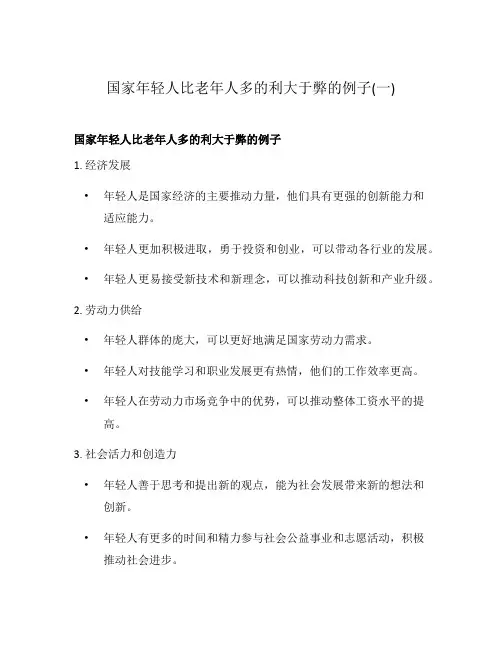
国家年轻人比老年人多的利大于弊的例子(一)国家年轻人比老年人多的利大于弊的例子1. 经济发展•年轻人是国家经济的主要推动力量,他们具有更强的创新能力和适应能力。
•年轻人更加积极进取,勇于投资和创业,可以带动各行业的发展。
•年轻人更易接受新技术和新理念,可以推动科技创新和产业升级。
2. 劳动力供给•年轻人群体的庞大,可以更好地满足国家劳动力需求。
•年轻人对技能学习和职业发展更有热情,他们的工作效率更高。
•年轻人在劳动力市场竞争中的优势,可以推动整体工资水平的提高。
3. 社会活力和创造力•年轻人善于思考和提出新的观点,能为社会发展带来新的想法和创新。
•年轻人有更多的时间和精力参与社会公益事业和志愿活动,积极推动社会进步。
•年轻人在社交网络和媒体的影响力较大,可以传播积极正能量。
4. 文化传承和创新•年轻人对新技术的应用更为熟悉,可以将传统文化与现代科技相结合,创造出新的表现形式。
•年轻人更加热衷于保护和传承民间文化,推动文化多元化和创新。
•年轻人具有更广阔的视野和开放的思维,可以为传统文化注入新的活力。
5. 社会稳定和民主发展•年轻人更加关注社会问题,积极参与社会变革,推动社会公平正义。
•年轻人更具有民主意识和参与政治的积极性,可以促进民主制度的发展和完善。
•年轻人的参与和表达,能够减少不稳定因素,维护社会的和谐稳定。
这些例子表明,国家年轻人比老年人多的利大于弊。
年轻人的活力和创造力为国家的发展注入了新的动力,他们对经济、劳动力供给、社会、文化和政治等方面都起到了积极的推动作用。
国家应当重视培养年轻人的创新能力和责任心,为他们提供更多的发展机会和空间。
同时,年轻人也应该自觉承担起自身的责任,积极参与社会建设,为国家的繁荣发展贡献自己的力量。
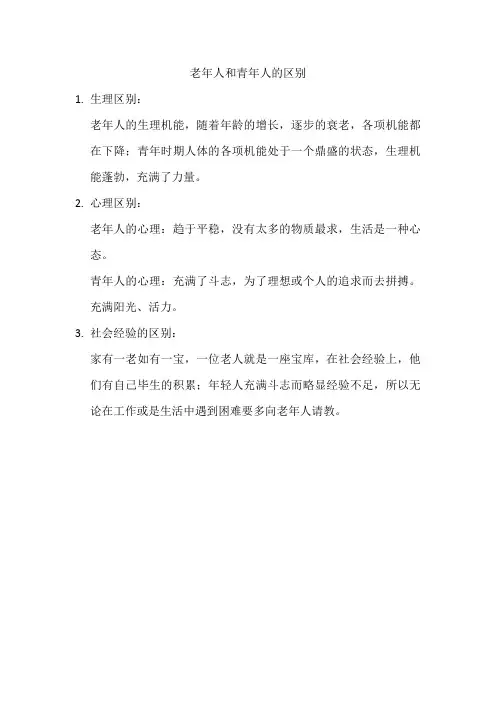
老年人和青年人的区别
1.生理区别:
老年人的生理机能,随着年龄的增长,逐步的衰老,各项机能都在下降;青年时期人体的各项机能处于一个鼎盛的状态,生理机能蓬勃,充满了力量。
2.心理区别:
老年人的心理:趋于平稳,没有太多的物质最求,生活是一种心态。
青年人的心理:充满了斗志,为了理想或个人的追求而去拼搏。
充满阳光、活力。
3.社会经验的区别:
家有一老如有一宝,一位老人就是一座宝库,在社会经验上,他们有自己毕生的积累;年轻人充满斗志而略显经验不足,所以无论在工作或是生活中遇到困难要多向老年人请教。
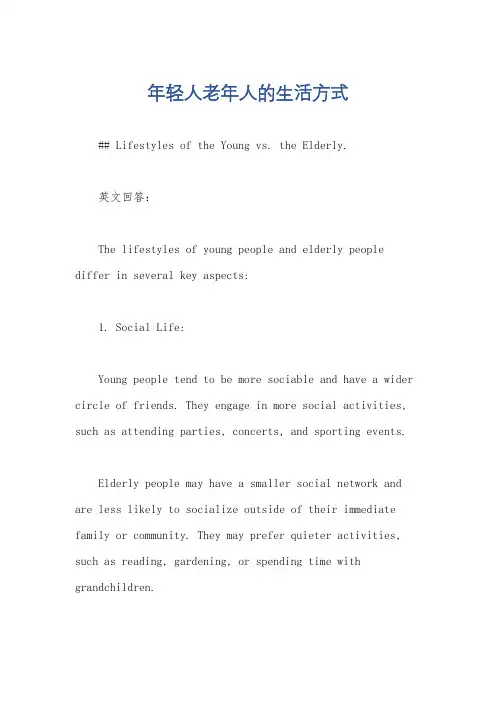
年轻人老年人的生活方式## Lifestyles of the Young vs. the Elderly.英文回答:The lifestyles of young people and elderly people differ in several key aspects:1. Social Life:Young people tend to be more sociable and have a wider circle of friends. They engage in more social activities, such as attending parties, concerts, and sporting events.Elderly people may have a smaller social network and are less likely to socialize outside of their immediate family or community. They may prefer quieter activities, such as reading, gardening, or spending time with grandchildren.2. Physical Activity:Young people are generally more physically active. They participate in sports, exercise, and other forms of recreation.Elderly people may have decreased mobility and physical activity levels. They may experience age-related health conditions that limit their ability to exercise.3. Technology Use:Young people are highly proficient in using technology. They use smartphones, tablets, and social media regularly.Elderly people may be less comfortable with technology and may not use it as frequently. They may have difficulty navigating complex digital devices or understanding social media platforms.4. Education and Career:Young people are typically in school or starting their careers. They are focused on developing their skills and establishing themselves financially.Elderly people are more likely to be retired or have a less demanding work schedule. They may have more time for leisure activities or volunteer work.5. Health and Wellness:Young people generally have better health and fewer chronic conditions. They may have more energy and vitality.Elderly people are more likely to experience age-related health concerns, such as arthritis, heart disease, or dementia. They may require more medical care and assistance with daily activities.6. Financial Situation:Young people may have lower incomes and less financial stability. They may be starting out in their careers andhave not yet accumulated significant wealth.Elderly people may have more stable financial situations. They may have retirement savings, pensions, or other sources of income.7. Outlook on Life:Young people tend to be more optimistic and have a positive outlook on the future. They may see many opportunities for growth and adventure.Elderly people may have a more cautious or realistic outlook on life. They may reflect on their past experiences and focus on their remaining time.8. Values and Beliefs:Young people may have different values and beliefs compared to elderly people. They may be more open to new ideas, social change, and technological advancements.Elderly people may have more traditional values and beliefs. They may have been shaped by different historical and cultural experiences.中文回答:年轻人的生活方式与老年人的生活方式在几个关键方面存在差异:1. 社交生活:年轻人往往更善于交际,拥有更广泛的朋友圈。
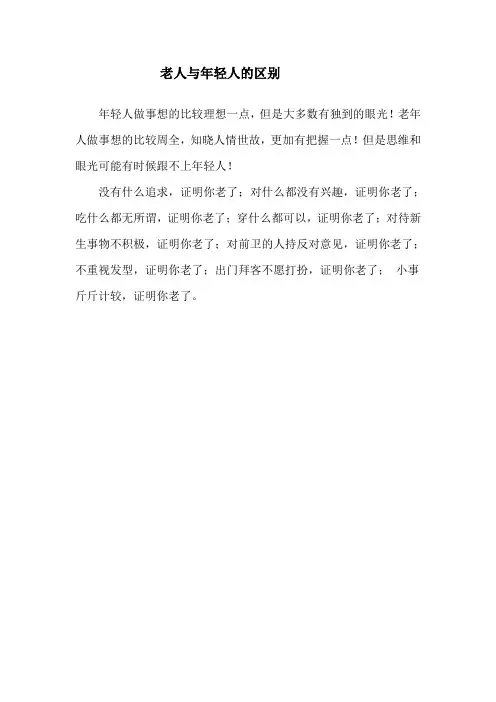
老人与年轻人的区别
年轻人做事想的比较理想一点,但是大多数有独到的眼光!老年人做事想的比较周全,知晓人情世故,更加有把握一点!但是思维和眼光可能有时候跟不上年轻人!
没有什么追求,证明你老了;对什么都没有兴趣,证明你老了;吃什么都无所谓,证明你老了;穿什么都可以,证明你老了;对待新生事物不积极,证明你老了;对前卫的人持反对意见,证明你老了;不重视发型,证明你老了;出门拜客不愿打扮,证明你老了;小事斤斤计较,证明你老了。
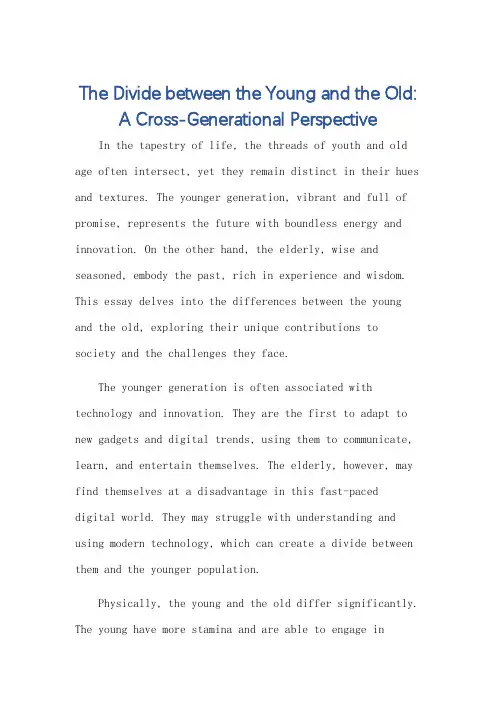
The Divide between the Young and the Old:A Cross-Generational PerspectiveIn the tapestry of life, the threads of youth and old age often intersect, yet they remain distinct in their hues and textures. The younger generation, vibrant and full of promise, represents the future with boundless energy and innovation. On the other hand, the elderly, wise and seasoned, embody the past, rich in experience and wisdom. This essay delves into the differences between the young and the old, exploring their unique contributions to society and the challenges they face.The younger generation is often associated with technology and innovation. They are the first to adapt to new gadgets and digital trends, using them to communicate, learn, and entertain themselves. The elderly, however, may find themselves at a disadvantage in this fast-paceddigital world. They may struggle with understanding and using modern technology, which can create a divide between them and the younger population.Physically, the young and the old differ significantly. The young have more stamina and are able to engage inphysical activities with ease. They can stay up late, recover quickly from illnesses, and are generally more resilient to the rigors of daily life. On the contrary, the elderly may experience physical limitations and health issues that require them to pace themselves and takeregular rest.Mentally, the divide is equally apparent. The young are typically more open to new ideas and experiences, eager to explore and learn. They are less burdened by the past and more focused on the future. The elderly, on the other hand, draw strength from their past experiences and wisdom. They are often more content with their lives, less prone to rash decisions, and more appreciative of the present moment.Socially, the young and the old occupy different spaces. The young tend to gravitate towards social media anddigital platforms to connect with their peers and sharetheir experiences. The elderly, on the other hand, mayprefer traditional social gatherings and interactions, such as meeting with friends and family or participating in community events.Despite these differences, it is important to recognize that both the young and the old have valuable contributions to make to society. The young bring energy, creativity, and innovation, while the elderly offer wisdom, stability, and a sense of continuity. It is only when we embrace these differences and learn from each other that we can create a truly inclusive and harmonious society.**老年人与年轻人的差异:跨代视角**在生命的织锦画中,年轻人与老年人的线条常常交织在一起,但它们的色彩和纹理却截然不同。
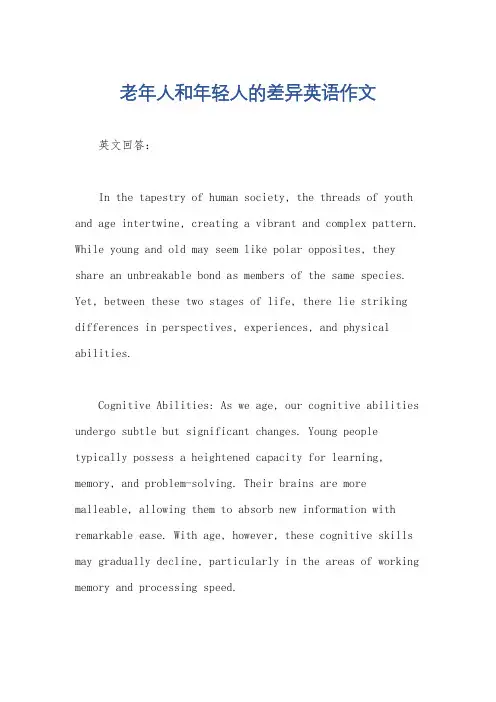
老年人和年轻人的差异英语作文英文回答:In the tapestry of human society, the threads of youth and age intertwine, creating a vibrant and complex pattern. While young and old may seem like polar opposites, they share an unbreakable bond as members of the same species. Yet, between these two stages of life, there lie striking differences in perspectives, experiences, and physical abilities.Cognitive Abilities: As we age, our cognitive abilities undergo subtle but significant changes. Young people typically possess a heightened capacity for learning, memory, and problem-solving. Their brains are more malleable, allowing them to absorb new information with remarkable ease. With age, however, these cognitive skills may gradually decline, particularly in the areas of working memory and processing speed.Resilience and Recovery: In the face of adversity, young people often exhibit greater resilience and quicker recovery times. Their bodies are more adaptable, and their immune systems are more robust. As we age, our resilience tends to diminish, and our bodies may take longer to heal and repair themselves.Physical Strength and Energy: Young adulthood is synonymous with peak physical strength and energy. Young people are more agile, have faster reflexes, and can endure prolonged physical exertion. As we age, our muscle mass and bone density decrease, leading to a decline in strength, endurance, and mobility.Emotional Intelligence: Emotional intelligence, the ability to recognize and manage one's own emotions as well as those of others, develops gradually throughout life. Young people may tend to be more impulsive and less adept at regulating their emotions. With age, however, emotional intelligence tends to increase as individuals gain experience and maturity, allowing them to navigate complex emotions more effectively.Life Experience and Wisdom: One of the most profound differences between young and old is the vast gap in life experience. Young people have a relatively short history to draw upon, while older adults possess a wealth of knowledge and wisdom gained through decades of living. This experience allows older adults to offer invaluable guidance and perspectives, while younger people bring fresh ideas and a willingness to embrace change.Relationships and Social Roles: Young people are often more focused on establishing their independence, building relationships, and exploring their career paths. Older adults, on the other hand, may prioritize spending time with family, engaging in hobbies, and reflecting on their past. Social roles also change with age, as young people may assume responsibilities of parenthood and career while older adults may transition into retirement or volunteer work.Perspectives on Time: Young people tend to have a more expansive view of time. They perceive the future aslimitless and often feel a sense of urgency to accomplish their goals. Older adults, on the other hand, may have a more tempered perspective on time. They appreciate the present moment and may place greater value on experiences over material possessions.中文回答:老年人和年轻人的差异。
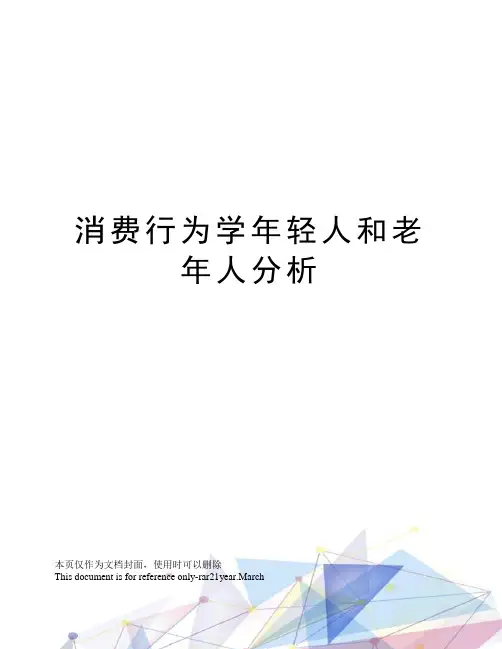
消费行为学年轻人和老年人分析本页仅作为文档封面,使用时可以删除This document is for reference only-rar21year.March影响消费的因素-----之50后和95后对比研究分析李园馨工商管理2班经过1周的调查访问,以下是我们的调查数据我们从上述调查表可以看出,老年人和年轻人的消费观念上有很大的不同。
老年人更在乎质量,合适程度,牌子以老牌子为主。
年轻人在乎品牌、流行程度和外观那么究竟是什么造成这种情况?►从消费的品牌观念看。
老年人更喜欢老牌子,同时对牌子的要求没那么高。
他们觉得只要好就可以了。
而年轻人更愿意追求品牌,而且年轻人更喜欢新潮的品牌,跟随时尚。
那么是什么造成老年人和年轻人在牌子上的选择差异那很多的老年人在长期的消费中形成了一种比较稳定态度倾向和习惯的行为方式。
由于老年人有着比别人更多的经历,见多识广、经验丰富,往往表现出较强的自信和自尊。
他们选择商品时往往选择的是以前光顾过的产品,喜欢以自己的经验来评价商品的优劣。
老年人在长期的消费生活中形成了较稳定的消费习惯,具有较高的品牌忠诚度,这也会在很大程度上影响他们的购买行为,一旦对商品或品牌形成了偏爱,就很难改变去消费别的品牌的商品。
老年人的习惯消费心理往往在某一定的程度上减少对商品的思考和判断,或是为了减少麻烦而消费风险知觉。
而对于年轻人来说:现在20岁左右的年轻人,恰好出生于上世纪80年代末90年代初,他们的成长过程,几乎就是消费主义在中国从发轫走向流行的过程。
他们没有在艰苦环境下生活过,受传统的勤俭持家、艰苦奋斗的教育较少,而高消费的价值观和追求时尚的生活方式成为他们成长的环境。
经历过坎坷的家长(特别是独生子女的家长)往往不愿意子女再继续“吃苦”,使他们在消费观念上容易接受奢侈品,甚至超前消费、负债消费。
而且他们一般都是独生子女,有着很强烈的优越感和被认同感。
品牌能够满足他们的虚荣心和自尊心。
被所有人尊重认同。
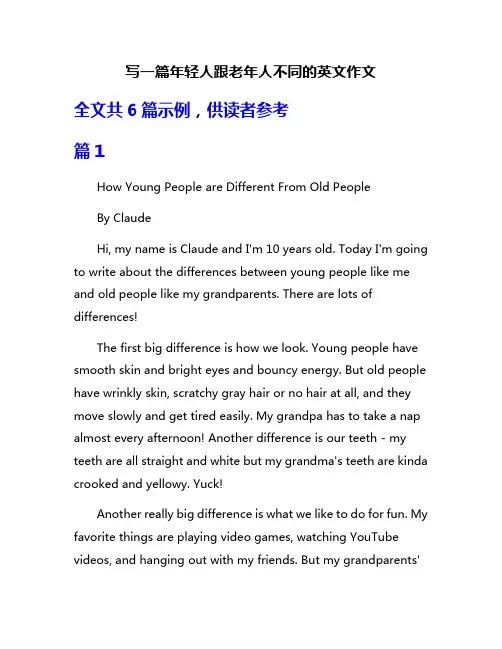
写一篇年轻人跟老年人不同的英文作文全文共6篇示例,供读者参考篇1How Young People are Different From Old PeopleBy ClaudeHi, my name is Claude and I'm 10 years old. Today I'm going to write about the differences between young people like me and old people like my grandparents. There are lots of differences!The first big difference is how we look. Young people have smooth skin and bright eyes and bouncy energy. But old people have wrinkly skin, scratchy gray hair or no hair at all, and they move slowly and get tired easily. My grandpa has to take a nap almost every afternoon! Another difference is our teeth - my teeth are all straight and white but my grandma's teeth are kinda crooked and yellowy. Yuck!Another really big difference is what we like to do for fun. My favorite things are playing video games, watching YouTube videos, and hanging out with my friends. But my grandparents'idea of fun is things like going to bingo night at the community center, doing jigsaw puzzles, and watching old black-and-white movies on TV. No thanks! Those things seem so boooring to me. Although I do like spending time with my grandparents, just not doing their boring old people activities.The clothes we wear are really different too. I like wearing t-shirts with cool designs, ripped jeans, and trendy sneakers. But grandma and grandpa always wear plain old clothes like sweaters, khaki pants, and comfortable walking shoes. No style at all! Even the way we smell is different - young people wear fresh fruity perfumes and colognes but old people kinda have that old person smell. I don't know how to describe it, but you know what I mean if you've been around a lot of elderly people!Another big difference is how we think about technology. I'm a total expert when it comes to phones, tablets, apps, video games, you name it. I can make my way around any new phone or gadget pretty easily. But my grandparents are always asking me for help with super basic tech stuff like sending emails or setting up their TV. And they get so frustrated when things don't work right away! I have to be really patient when walking them through tech tasks. It's kinda funny but also kinda sad.Speaking of technology, that brings me to another difference - young people are always up on the latest slang, memes, TikTok trends and篇2How Young People and Old People are Not the SameHi! My name is Jamie and I'm going to tell you all about how kids and grandpas and grandmas are really different. I've noticed lots of ways we are not the same at all.First of all, old people move around much slower than us kids. My grandparents walk so slowly, it's like they're moving through pudding or something. They can't run or jump or anything. I'm so fast, I can run circles around them! One time, my grandpa tried to chase me and he couldn't even keep up. We had to stop the game because he couldn't breathe!Another way we're different is our energy levels. Old people get tired very easily. My grandma will take a nap pretty much every day after lunch. Can you imagine having to sleep that much?! As a kid, I pretty much never want to nap unless I'm sick. I have so much energy to play outside, run around, and never stop moving. Sometimes my parents even say I have too much energy!We also look really different from each other. Honestly, I think old people look kind of weird and funny! Their skin gets all wrinkly like a shar pei dog. And their hair turns gray or white or sometimes they don't have much hair at all on their heads. A lot of grandpas are bald. Kids obviously don't have wrinkly skin or gray hair. We have smooth skin and hair in all different colors like blonde, brown, red, or black.Old people's bodies look different too. Their backs get hunched over and their arms and legs get really skinny. Grandmas and grandpas have a hard time bending over to pick things up off the floor. Meanwhile, kids' bodies are still growing bigger and stronger every day! I'm gaining more muscle and getting taller all the time.The interests and hobbies of kids versus old people are really different as well. I love playing active games like tag, basketball, riding bikes and skateboards, and running around at the playground. My grandparents' hobbies are way more chill and boring. They like watching TV, reading books, doing puzzles, going for slow walks, and just sitting outside in the sun. No thanks! I'd much rather be running and jumping than watching TV.We even eat different foods. I love all the good stuff like pizza, burgers, fries, chicken nuggets, mac and cheese, candy, and ice cream. But my grandparents are always eating plain, boring foods like baked chicken, steamed vegetables, oatmeal, and diet shakes. Where's the fun in that? No wonder their bodies look so skinny if they never eat anything good! I want my food to taste delicious.Speaking of eating, old people's teeth look pretty scary too.A lot of grandparents have dentures instead of regular teeth, or they only have a few teeth left that are yellow and crooked. It makes me really appreciate having a bright, white smile with all my teeth! I brush them twice a day so they'll never look like old people teeth.We sound different as well. I have a high-pitched,young-sounding voice while my grandparents talk in these really low, gravelly tones. Old people's voices always sound like they've been smoking a million cigars or something. They also repeat themselves a lot and are kind of hard of hearing. So we'll be having a conversation and I have to keep repeating myself louder and louder.The ways we use technology couldn't be more different either. Kids like me love video games, social media, phones,tablets, and computers. We were basically born using that stuff! Old people didn't grow up with a lot of technology though. I have to show my grandparents how to do everything on their phone or computer. They get so confused by any new app or device. It's hilarious watching them try to be modern andtech-savvy.Our slangs and ways of talking aren't the same at all either. I use tons of slang words and sayings with my friends that my grandparents would never understand. Like "That's fire!" or "Slay queen!" or "It slaps." They'd just look at me like I'm speaking another language. Old people also say really outdated phrases that nobody my age would use anymore like "What's the buzz?" or "That Body suit sends!"Ooh, here's another big one - the clothes we wear are so different! I like wearing trendy, stylish clothes like ripped jeans, crop tops, leggings, Vans shoes, hoodies, and graphic tees. But have you seen what old people wear? Big ol' sensible shoes, ugly sweaters, mom jeans, fanny packs - they dress like篇3How Young People are Different from Old PeopleYoung people and old people are very different! They look different, they act different, and they like different things. Let me tell you about some of the biggest differences between young people and old people.First of all, young people and old people look really different on the outside. Young people have smooth skin and bright eyes. Their hair is thick and colorful. They have lots of energy to run and jump around all day. But old people have wrinkly skin and their eyes look tired. A lot of old people don't have much hair left, or what's left is gray or white. They move slowly and seem to get tired easily.Another big difference is how young people and old people act. Young people are active, playful and loud. They are always running around, shouting, laughing and being silly. Sometimes they don't listen very well or follow the rules. But old people are calm and quiet. They like to sit still and read books or watch TV. They always follow the rules and do what they're told. Young people have short attention spans, but old people are patient.Young people and old people also like very different things. Young people love playing games, both video games and outdoor games like tag or hide-and-seek. They get excited about toys, cartoons, super heroes and anything fun and silly. But oldpeople don't really care about games and toys. They would rather do grown-up activities like gardening, knitting, wood carving or putting together puzzles. Young people listen to loud, modern music, but old people prefer classical music, jazz or folk songs.The food young people like is also quite different from old people's food. Young people want to eat pizza, hamburgers, chicken nuggets, hot dogs, French fries, candy, ice cream and other fun foods all the time. But old people would rather eat soups, vegetables, fish, oatmeal and other healthy foods that are better for them. Young people guzzle down tons of soda and juice, but old people drink more milk, tea and coffee.Young people and old people do have some things in common though. For example, they can both be stubborn sometimes and not want to do what others tell them. And they both get grumpy if they don't get enough sleep! But in general, young people act very differently from old people in most ways.In school, young students are always energetic, talkative and fidgety. They would rather run around outside than sit at their desks. But the older teachers are very serious and want everyone to be quiet and pay attention. Students dread having to writebook reports or do math homework, while teachers consider those things fun!When it comes to spending money, young people want to buy the latest trendy clothes, shoes, apps, video games and other cool stuff their friends have. Old people just want plain, comfortable clothes that are on sale. They would rather save their money than spend it on a bunch of flashy things they don't need.I think the biggest difference between young people and old people is how they see the world. Young people are optimistic, curious and open to new experiences. They are excited to grow up and see what amazing adventures life has in store. But many old people are set in their ways and don't want to try new things. They have already seen a lot in their lives and are just waiting for the end to come.Of course, not every young person is exactly the same, and not every old person is exactly the same either. Some young people act very mature for their age, and some old people stay active and young at heart. But in general, being young and being old leads to very different personalities, interests and lifestyles.Young people and old people can learn a lot from each other if they make the effort to understand one another. Young peoplecan teach old people to keep an open mind, have fun and not take life too seriously. Old people can teach young people patience, wisdom from their many experiences, and how to appreciate the simple things in life.I am truly grateful to all the old people in my life – my grandparents, great aunts and uncles, family friends and teachers. They have helped shape who I am today with their advice and life lessons. At the same time, I cherish my youth and will make the most of every moment before I eventually become an old person myself some day!So those are some of the biggest ways that young people and old people are different. We all start out young, but before you know it, you've grown up and have turned into an old person yourself. It's the cycle of life! I hope young people and old people everywhere can respect each other and appreciate what each has to offer.篇4Differences Between Young People and Old PeopleBy: A 4th GraderYoung people and old people are really different! I'm a kid, so I know all about how us young people act. But I also know some old people, like my grandparents, and they are nothing like me and my friends. Let me tell you about the biggest differences I've noticed.Energy LevelsOne of the biggest differences is energy levels. Us kids are bouncing off the walls with energy all day long! We run around at recess, we fidget at our desks, we can't sit still for longer than a few minutes. My grandpa is the opposite - he's always taking naps and sitting in his recliner watching TV. He gets tired just from walking across the room. I don't know how old people function with so little energy!InterestsKids and old people also have totally different interests. Kids are interested in fun things like video games, movies, sports, music, and telling jokes and being silly. Old people don't seem to care about any of that stuff. My grandma is really interested in things like watching bird feeders, doing crossword puzzles, and talking about "her soaps" (I think that means soap operas?). She also likes talking about "when I was a girl..." and telling storiesfrom the past that we find boring. Overall, super lame interests if you ask me!TechnologyAnother big difference is technology skills. Kids pick up new tech so fast - I was navigating apps and games on a tablet before I could even read! But a lot of old people really struggle with technology. My grandparents can barely even use their smartphones or computer. I have to help them with everything from entering web addresses to setting calendar reminders. I don't get how they function without understanding tech!FashionKids and old people definitely do not dress the same either. Kids dress in whatever is trendy and cool - things like graphic tees, hoodies, athletic shorts/pants, and trendy sneakers. We choose bright, fun colors and patterns that look awesome. Old people's fashion is just plain boring. My grandpa wears the same few old man pants and button down shirts on repeat. No style at all! And my grandma weighs herself down with long skirts and floral printed blouses that couldn't be further from trendy. No thanks!PersonalityPersonality-wise, there are some key differences too. Kids are fun, energetic, loud, curious, and always joking around. We get excited about everything and have big emotions (that's why adults are always telling us to use our "inside voices"). Old people's personalities are more muted. They are usually pretty quiet, mellow, and like routine. My grandparents barely crack smiles or jokes. It's like they've forgotten how to loosen up and be silly! No fun at all if you ask me.So as you can see, young people like kids and old people like grandparents really are worlds apart. We have different energy levels, different interests, different tech abilities, different fashion, and different personalities. I love my grandparents, but I'm definitely grateful to be a kid and not an old person! Being a kid is way more fun and exciting. Maybe when I'm a grandparent myself one day I'll understand what it's like on the other side. But for now, I'll just keep being a kid who loves video games, goofing off with friends, and having way more energy and style than any old person! Let me know if you notice any other major differences between kids and grandparents.篇5My Grandma is Old But I am Young!Hi friends! Today I want to tell you about the big differences between me and my grandma. She is a really old lady and I am just a kid. We may live together, but we are nothing alike!First of all, grandma is super duper old. I'm not sure exactly how old she is, but I think she is like a gazillion years old. She has white hair and wrinkly skin and she moves really slow. Sometimes she even uses a walker to get around. Me, on the other hand, I'm only 8 years old. I have smooth skin and lots of energy. I can run really fast and do cartwheels. Grandma can't do any of those things!Another way we are different is what we like to do for fun. Grandma's idea of fun is sitting in her rocking chair, sipping tea, and watching her boring old TV shows. blehhh! That sounds so dull and no fun at all. When I want to have fun, I go outside and play on the swing set or ride my bike. Or I'll play video games and build cool things with Legos. Grandma doesn't understand any of that stuff. She just tells me I'm wasting my time.Grandma also dresses really weird and old-fashioned. She wears these long grandma dresses that go down to her ankles. They are flowery and have an old-lady smell. I don't know how she can stand it! Me, I love wearing cool t-shirts with my favorite superheroes on them. And trendy ripped jeans. Sometimes I'lleven dye my hair a funky color like bright blue or purple. Grandma would probably have a heart attack if I did that. She thinks I should "act my age" but I think she needs to loosen up and be more fun!The way grandma talks is also really outdated and strange. She says things like "heavens to betsy" and "Land o'Goshen." What does that even mean?? She also calls the bathroom the "loo" which makes me laugh every time. When I talk, I use modern words and slang that all the cool kids use like "lit" or "that slaps." Grandma just stares at me with a confused look on her face when I do that. Once I tried to get her to do a TikTok dance with me but she just did a few awkward moves and said "Oh fiddle-dee-dee, this is too much for my old bones!"Something grandma loves that I can't stand is her gross smelly prune juice and other old people foods like bran muffins. How can anyone actually enjoy eating things like that? They taste like wet socks! When I get my snacks, I go for the good stuff like gummy worms, Pop-Tarts, and root beer floats. Soooo much better than grandma's treats.Grandma also falls asleep at like 7 pm while watching Wheel of Fortune or whatever old person shows she watches. What a total snooze fest! I'm just getting started having fun at 7 o'clock.That's when all my favorite cartoons come on TV. Or I'll play video games or video chat with my friends late into the night. By the time I finally go to bed around midnight, I can hear grandma's annoying wheezy snores through the walls.I guess those are the main ways grandma and I are opposites because she is a crabby old lady and I am a fun cool kid. Sometimes grandma will say I should "respect my elders" but I think she should try being more like a kid - energetic, fun, and awesome! We'll never see eye-to-eye but I still love spending time with her. Even if she does bore me to tears sometimes. What can I say, I'm a cool kid and she's my grandma!篇6Essay: Young People and Old People Are Really DifferentHi, my name is Tommy and I'm going to write about how young people like me are really different from old people like my grandparents. There are a lot of differences between us!One of the biggest differences is the things we like to do for fun. Young people like playing video games, watching YouTubers, going on social media, and just hanging out with friends. We have a lot of energy so we like running around and being active too. But old people seem to like way more boringstuff. My grandparents' idea of fun is watching TV, going to early bird dinner specials, or playing cards or bingo. Snooze fest! They get tired pretty quickly too from walking around or anything physical. I don't get how they can be so inactive and lazy all the time. Don't they get bored out of their minds?Another huge difference is how we use technology. Kids today are experts with smartphones, tablets, gaming consoles, and computers. We use them all the time for games, homework, social stuff - everything! Tech is just natural and normal to us. But a lot of older people struggle big time with any kind of technology. My grandpa can barely even check his email without help. It's like the most basic things confuse them. I had to show my grandma how to text like a million times. Why is it so hard for them to learn? Didn't they have TVs and radios when they were kids? You'd think they'd be able to figure out new technology better.The way we talk and communicate is really different too. Young people tend to use a lot of slang words that older people don't understand. We'll say things like "That's lit" or "No cap" and our grandparents have no clue what we're talking about. We also tend to purposely misspell words like "tho" instead of "though" when texting. Or we'll come up with goofy new phrasesall the time like "It's the ___ for me." Old people definitely do not talk or text that way at all. They use way more proper grammar and bigger vocabulary words that kids think are outdated or unnecessary. It's like we're speaking different languages sometimes!Speaking of languages, another difference is that a lot of young people today are growing up speaking multiple languages because of their parents or where they live. But most older Americans just speak English. At my school, I have friends who can speak Spanish, French, Mandarin, Arabic, and all kinds of other languages with their families. I'm taking Spanish classes too. But my grandparents only know a tiny bit of Spanish they picked up from TV shows. It must be hard for them when they go somewhere and can't understand anything being said around them.Our styles in fashion and music are incredibly different as well. Younger people tend to follow whatever is trendy on social media or with celebrities. Clothing with certain logos, colors, or styles suddenly becomes super popular for a few months until something else becomes cool. We also listen to rap, pop, hip hop, and modern styles of music that a lot of older people can't stand. On the other hand, senior citizens tend to have moreconservative styles of dress that were fashionable for their generation decades ago. They also mainly listen to classic rock, country, or whatever musical genres were around when they were young too. I guess it's hard to adapt to all the rapid changes in fashion and music when you get older.Young and old people also tend to have very different diets and eating habits. As a kid, I of course love all the typical junk foods - pizza, burgers, fries, chips, cookies, candy, soda, you name it. Lots of sugar and salt is delicious to me. But my grandparents are always pushing gross healthy foods like baked fish, steamed veggies, high fiber cereals, and prune juice. No thanks! They have to avoid fatty or sugary treats because of cholesterol, blood pressure, and other old people health issues I guess. Their portions are tiny too compared to what I can pack away. Maybe when I'm older my tastes will change, but for now give me all the grease and calories possible!There are just so many other differences too. Adults tend to go to bed much earlier than kids who want to stay up all night. Old people go through medications like candy to survive while kids take almost nothing. We have way more homework and school responsibilities while they're retired with not much to do.They face all kinds of health crisises that we never have to think about yet. The list just goes on and on.So in conclusion, you can definitely see how young people like me are worlds apart from the elderly in our daily lives, interests, skills, communication styles, views, and experiences. I have a hard time relating to older generations, and I'm sure they often can't understand kids today either. We just seem to live in parallel worlds sometimes. But I do hope that if I'm fortunate enough to live into old age myself someday, I'll be a "cool" grandpa who can keep up with the latest trends, unlike myout-of-touch grandparents now! Only time will tell if I manage to stay young at heart forever.。

老人和年轻人的区别
1.年龄,老年人指60岁以上,年轻人多指20--40岁的人。
2.性格老年人稳重考虑事情相对前面,年轻人性格相对急躁,冲动。
3.身体老年人体质、体力、免疫力、器官功能、心脑血管都较年轻人减弱。
4.生理老年人肝肾功能相对年轻人要低。
性生活方面比年轻人要弱很多。
5.心态老年人对生活充满乐趣,心态自然随和,年轻人易得患得失,情绪大起大落。
6.财富多数老年人积累了较多财富,开始享受生活,年轻人多在积极打拼,积累财富。
7.兴趣老年人多喜欢凑到一起下下棋、聊聊天、听听戏;年轻人多追求刺激、劲爆的活动或生活。
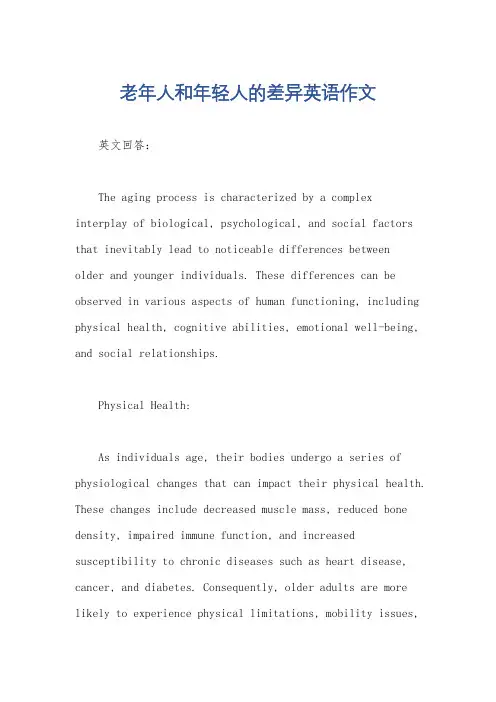
老年人和年轻人的差异英语作文英文回答:The aging process is characterized by a complexinterplay of biological, psychological, and social factors that inevitably lead to noticeable differences betweenolder and younger individuals. These differences can be observed in various aspects of human functioning, including physical health, cognitive abilities, emotional well-being, and social relationships.Physical Health:As individuals age, their bodies undergo a series of physiological changes that can impact their physical health. These changes include decreased muscle mass, reduced bone density, impaired immune function, and increased susceptibility to chronic diseases such as heart disease, cancer, and diabetes. Consequently, older adults are more likely to experience physical limitations, mobility issues,and increased risk of falls.Cognitive Abilities:Cognitive abilities also undergo changes with age. While some aspects of cognition, such as vocabulary and crystallized intelligence, may remain stable or even improve with age, others, such as fluid intelligence and working memory, typically decline. This decline can affect attention, memory, and problem-solving abilities, potentially impacting daily functioning and independence.Emotional Well-being:Older adults may experience different emotional experiences compared to younger individuals. They may be more likely to report feelings of loneliness, isolation, and regret. However, they may also have a greater sense of purpose, wisdom, and contentment. Emotional well-being in older age is influenced by a combination of factors, including physical health, cognitive abilities, social support, and life experiences.Social Relationships:Social relationships play a crucial role in the lives of older adults. They provide opportunities for companionship, emotional support, and a sense of belonging. However, the nature of social relationships can change with age. Older adults may have fewer close friends and family members due to death, retirement, or geographical distance. They may also experience decreased participation in social activities and community involvement.It's important to recognize that the differences between older and younger individuals exist along a continuum and vary widely among individuals. Not all older adults will experience the same level of physical, cognitive, or emotional changes. Age-related differences are influenced by a host of genetic, environmental, and lifestyle factors.中文回答:身体健康:随着年龄的增长,身体会发生一系列生理变化,影响身体健康。
青年人与老年人
青年人和老年人是社会中两个不同年龄阶段的群体,他们在很多方面有着明显的差异。
1. 生理健康:青年人通常身体强健,具有更高的身体活力和耐力,更容易恢复体力。
老年人则身体机能逐渐衰退,容易遭受各种慢性疾病的困扰。
2. 心理特点:青年人通常具有较高的积极性和冒险精神,追求自我价值的实现,注重
个人成长和发展。
老年人则更关注家庭和社会关系,经验丰富,对事物有更成熟的思
考和判断。
3. 生活方式:青年人通常更活跃,喜欢尝试新事物,追求自由和独立。
老年人则更倾
向于保守和稳定的生活方式,注重家庭和社区的联系。
4. 社交圈子:青年人交际圈相对较广,更喜欢结交新朋友和拓展人脉。
老年人则交际
圈相对较小,更注重与家人和老友的联系。
尽管两个群体存在差异,但他们也有很多相似之处:都需要关爱、尊重和社会支持,
都有追求幸福和健康的需求,都对社会有所贡献的能力。
老年人对家具的需求一、概述随着社会老龄化进程的加快,老年人对家具的需求也日益增长。
老年人作为一支重要消费群体,其对家具的需求特点与年轻人有所区别。
本文将从老年人的生活习惯、健康需求和智能化需求等方面探讨老年人对家具的需求,并提出一些建议。
二、老年人的生活习惯老年人的生活习惯与年轻人存在较大差异。
他们往往更注重舒适度和稳定性,对于家具的安全性和稳定性有更高的要求。
2.1 稳固性老年人往往行动不便,更加需要家具提供的稳定支撑。
对于桌椅、床和橱柜等家具,老年人会更加倾向于选择稳固性较高的产品。
2.2 便利性由于老年人体力衰退,日常生活中存在各种不便之处。
因此,对于家具的便利性需求也较高。
比如,老年人喜欢选择配有抽屉和储物功能的床、柜子等,以方便收纳和取用物品。
三、老年人的健康需求老年人对家具的健康需求是考虑因素中的重要一环。
选择合适的家具有助于老年人的健康和舒适。
3.1 人体工学老年人在选择家具时,人体工学因素尤为重要。
对于椅子,老年人会更青睐于可调节座椅高度和靠背角度的产品,以提供更好的支撑和舒适度。
3.2 材质老年人对材质的选择也与健康相关。
他们往往更偏好无毒、环保的材质,如天然木材和低污染度的板材。
这些材质能有效减少甲醛等有害物质对老年人的危害。
3.3 防滑性老年人的身体平衡能力下降,对于家具的防滑性也有较高的要求。
例如,防滑地垫、防滑脚套等设计能有效提高老年人使用家具的安全性。
四、老年人的智能化需求随着科技的发展,智能化家居已经成为一个热门的趋势。
老年人作为消费主体之一,对于智能化家具产品的需求也在逐渐增加。
4.1 便捷性智能化家具能够提供更便捷的使用体验,符合老年人对于生活的追求。
诸如智能开关、自动升降床和智能电视等产品,能够满足老年人日常生活的多样需求。
4.2 安全性智能化家具产品的安全性使其成为老年人选择的重要因素。
例如,智能家居安全系统、智能锁等产品能够提供老年人更高的安全保障。
4.3 健康护理智能化家具还可以提供一些专门针对老年人的健康护理功能。
话题5: 政府类:老人老龄化积极的影响:1. 经济:老年人可能对经济有一定帮助。
解释:可以推迟退休,要求的薪水可能不高解释2:经验可以帮助雇主解决很多问题同学,想查看词伙吗?postpone retirement, contribute wisdom, labour cost同学,想查看翻译吗?Elderly people may be an asset to a country in economic terms. They may postpone retirement. Inorder to stay in the workforce, they may not ask for high pay. This means that it can reduce thelabour cost of many companies. Meanwhile, their experience can help employers deal with manyproblems.2. 科技:A预期寿命的提高B 人们能够增进知识C 对社会是有益的。
解释(A-B)1:他们可以继续他们的研究项目,并在他们的职位上获得新的知识。
解释(A-B)2:他们也可以增加知识和建立专业知识:。
解释(B-C ):知识是创新的源泉,因为他们将新知识应用于解决一些问题,或开发一些具有新发现的创新产品或服务。
同学,想查看词伙吗?impart knowledge to young people, share experience, improved life expectancy, achieve more success同学,想查看翻译吗?The improvement of life expectancy also allows people to advance knowledge, which is of benefit to society. They may continue their research projects and gain new knowledge in their positions. It is also possible for them to increase knowledge and build expertise as they have a longer working life. Knowledge is a source of innovation, as they apply new knowledge to solving some problems or develop some innovative products or services with new discoveries.老龄化消极的影响:1. 经济:A老龄化B 青年劳动力的减少C 对经济造成压力解释(A-B):人口老龄化通常伴随着低出生率,因为人们知道他们可以活很久,他们倾向于推迟生育。
【五年级】五年级作文400字老人和年轻人老人和年轻人
在人群中,老人和年轻人总是占据着不同的位置。
他们有着不同的生活经验,不同的
个性和追求。
有时候他们会因为一些事情而产生冲突,但其实他们都是社会中不可或缺的
一部分。
老人们常常被认为是有智慧和经验的代表。
他们经历过风风雨雨,见过世面,知道很
多道理。
他们总是以他们的生活经验和智慧来指导年轻人,希望年轻人能够少走弯路。
他
们有时候会敦促年轻人努力学习,不断进取,也会在生活上给予年轻人很多的帮助和支持。
但有时候,老人们却会因为年轻人的不解风情而感到生气和无奈,认为年轻人不懂事。
而年轻人则代表着活力和朝气。
他们对新事物总是充满好奇和热情,他们有很多新的
观点和想法。
他们总是在探索生活的新大陆,他们有时候也会对老人们的传统观念抱有异议,认为老人们的想法已经过时,不适合现代社会。
他们也会尊重老人们的意见,因为老
人们的智慧和经验仍然是宝贵的。
老人和年轻人虽然有着不同的特点和思维方式,但是他们之间却是相互依存的。
老人
们可以传播学问,年轻人可以给老人们带来活力和希望。
他们应该相互尊重、相互理解,
相互合作,这样社会才能更加和谐发展。
我们应该珍惜老人们的智慧,学会倾听他们的教诲;同时也要尊重年轻人的热情和活力,给予他们更多的理解和支持。
只有老人和年轻人携手合作,共同努力,才能让社会更
加美好,让人与人之间的关系更加和谐。
年轻人和老年人差异英语作文英文回答:The disparity between youth and old age is a multifaceted and timeless phenomenon, shaping the fabric of our societies and influencing the experiences ofindividuals across generations. While both young people and the elderly possess unique strengths and perspectives, it is their contrasting worldviews and life circumstances that often set them apart.One of the most striking differences between youth and old age lies in their relationship with time. Young people tend to perceive time as an endless expanse stretching before them, a future filled with infinite possibilities. They embrace the unknown with zeal, eager to explore new frontiers and forge their own paths. In contrast, the elderly often experience a heightened awareness of time's fleeting nature. The past looms large in their memories, while the future may seem more limited and uncertain.Another key distinction between the two age groups is their level of experience. Young people are brimming with energy and enthusiasm, but they may lack the wisdom and perspective that comes with age. They may be more prone to impulsive decisions and may underestimate the potential consequences of their actions. The elderly, on the other hand, have accumulated a wealth of knowledge and insights through their years of living. Their experiences have taught them the value of patience, reflection, and compromise.The societal roles and expectations placed on young people and the elderly also differ significantly. Young people are often expected to pursue education, establish careers, and start families. They may feel pressured to succeed and to conform to societal norms. The elderly, on the other hand, may have more time for leisure and personal pursuits. They may be less constrained by societal expectations and may have greater freedom to explore their interests and passions.Furthermore, the physical and cognitive changes that accompany aging can create a gulf between young people and the elderly. Young people typically enjoy good health and physical mobility. They are often active and engaged in a variety of pursuits. The elderly, however, may experience age-related declines in physical strength, mobility, and cognitive function. These changes can limit their independence and make it more challenging to participate in certain activities.Despite these differences, it is important to recognize that youth and old age are not mutually exclusive categories. There are many young people who possess the wisdom and maturity of the elderly, and many elderly individuals who retain the energy and enthusiasm of youth. Moreover, the experiences and perspectives of each age group can complement one another, creating a rich tapestry of knowledge and understanding.中文回答:年轻人和老年人的差异。
老年人们和年轻人过假期的不同英语作文在现代社会,假期是人们放松身心、休息调整的宝贵时光。
不同年龄段的人们对待假期的方式却各有不同,尤其是老年人和年轻人在度假期间的行为、偏好和需求常常存在显著的差异。
这些差异不仅反映了他们的人生阶段和生活方式,也体现了他们对生活的不同态度和价值观。
本文将深入探讨老年人与年轻人在假期期间的不同生活方式,分析他们各自的需求和喜好,并探讨这种差异背后的原因。
老年人在假期期间通常更注重休闲和舒适。
他们的生活节奏较为缓慢,假期的主要目标是放松和享受安静的时光。
许多老年人在假期中选择待在家里,享受家庭的温馨,或是从事一些轻松的活动,如读书、听音乐、园艺等。
这些活动不仅能够让他们舒缓压力,也能够让他们在熟悉的环境中感受到生活的乐趣。
许多老年人还喜欢和家人团聚,享受与子女和孙辈的亲密时光。
在他们看来,家庭的陪伴和温暖比任何外出的旅行更为重要。
与此不同,年轻人在假期期间通常更加追求冒险和刺激。
他们的生活节奏较快,假期对于他们来说是一个探索新事物和体验不同生活方式的机会。
年轻人往往选择去旅行,尤其是去一些风景名胜或异国他乡,他们希望通过旅行来丰富自己的经历,拓宽视野。
除了旅行,年轻人还喜欢参加各种娱乐活动,如音乐节、体育赛事、派对等,以此来释放压力,享受生活中的乐趣。
这种追求新鲜感和体验的态度,使得年轻人在假期期间常常显得更加活跃和多变。
假期的安排和规划也是老年人与年轻人之间的一大区别。
老年人在安排假期时通常会考虑到身体健康和安全因素。
他们可能会选择一些舒适的度假村或养老院,确保在度假期间的生活条件能够满足他们的健康需求。
例如,温泉疗养、轻松的散步路线和安静的环境都是他们考虑的因素。
由于身体的逐渐衰老,老年人通常会避免长途旅行或过于疲劳的活动,以保证假期的舒适和安全。
相对而言,年轻人在假期的安排上更具冒险精神和随意性。
他们可能会选择进行长途旅行、背包旅行,甚至尝试极限运动等。
这些活动往往需要较高的体力和精力,也意味着他们对假期的安排更加灵活和开放。
老人和年轻人的区别较大,和年轻人共有的不说,只说老年人特有的:
1、法龄区别:①年龄60岁的,从法律意义上讲,作为老年人。
但在社会和家庭层面上讲,不足60岁的,一样受尊重、保护(适用于民法)。
②中华人民共和国老年人权益保障法第二条:本法所称老年人是指六十周岁以上的公民(自1996年10月1日起施行)。
2、权利义务:受子女以及其他依法负有赡养义务的人的赡养与扶养义务(因病因残无劳动力不足60岁的参照执行)。
本条老年人,指家庭具体的人。
①老年人养老主要依靠家庭,家庭成员应当关心和照料老年人。
②赡养人应当履行对老年人经济上供养、生活上照料和精神上慰藉的义务,照顾老年人的特殊需要。
③赡养人对患病的老年人应当提供医疗费用和护理。
④赡养人应当妥善安排老年人的住房,不得强迫老年人迁居条件低劣的房屋。
⑤老年人自有的或者承租的住房,子女或者其他亲属不得侵占,不得擅自改变产权关系或者租赁关系。
⑥老年人自有的住房,赡养人有维修的义务。
⑦赡养人有义务耕种老年人承包的田地,照管老年人的林木和牲畜等,收益归老年人所有。
⑧赡养人不得以放弃继承权或者其他理由,拒绝履行赡养义务。
⑨赡养人不履行赡养义务,老年人有要求赡养人付给赡养费的权利。
⑩赡养人不得要求老年人承担力不能及的劳动。
3、社会保障:本条老年人,泛指广义的老年人。
①国家建立养老保险制度,保障老年人的基本生活。
②老年人依法享有的养老金和其他待遇应当得到保障。
有关组织必须按时足额支付养老金,不得无故拖欠,不得挪用。
③国家根据经济发展、人民生活水平提高和职工工资增长的情况增加养老金。
④农村除根据情况建立养老保险制度外,有条件的还可以将未承包的集体所有的部分土地、山林、水面、滩涂等作为养老基地,收益供老年人养老。
⑤城市的老年人,无劳动能力、无生活来源、无赡养人和扶养人的,或者其赡养人和扶养人确无赡养能力或者扶养能力的,由当地人民政府给予救济。
⑥农村的老年人,无劳动能力、无生活来源、无赡养人和扶养人的,或者其赡养人和扶养人确无赡养能力或者扶养能力的,由农村集体经济组织负担保吃、保穿、保住、保医、保葬的五保供养,乡、民族乡、镇人民政府负责组织实施。
⑦鼓励公民或者组织与老年人签订扶养协议或者其他扶助协议。
⑧国家建立多种形式的医疗保险制度,保障老年人的基本医疗需要。
⑨老年人患病,本人和赡养人确实无力支付医疗费用的,当地人民政府根据情况可以给予适当帮助,并可以提倡社会救助。
⑩医疗机构应当为老年人就医提供方便,对七十周岁以上的老年人就医,予以优先。
有条件的地方,可以为老年病人设立家庭病床,开展巡回医疗等服务。
提倡为老年人义诊。
4、体质区别:
①免疫力下降:头晕耳鸣、失眠多梦、消化不良、腰酸背痛、心慌气短、体虚多病。
②体力下降:没有承载货物能力,自身能力难求自己身平稳。
③老年人大脑皮层逐步萎缩辨识力记忆力下降,严重痴呆。
④器官功能下降:循环功能紊乱,呼吸衰竭,肝脏凝血酶原下降,消化系统胃屏障功能丧失出现溃疡及吸收不良,中枢神经系统器官衰竭和代谢改变。
⑤动静脉血管老化:动脉管壁增厚、变硬,失去弹性、管腔狭窄,大多数患者都或多或少有心悸、胸痛、胸闷、头痛、头晕、四肢凉麻、四肢酸懒、跛行、视力降低。
静脉老化,皮炎、水肿、静脉出血、皮肤瘀斑、肢端溃疡、静脉曲张、皮肤色素加深、静脉曲张性溃疡。